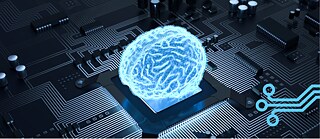Artificial intelligence
The sensitive algorithm

Artificial intelligence is now an integral part of our everyday lives. It makes our smartphones smarter and can diagnose disease and write screenplays. Are there any limits, and might it soon surpass us in creativity and empathy – and perhaps even help us achieve immortality one day?
By Johannes Zeller
Artificial intelligence (AI) refers to adaptive digital systems that independently hone their skills. Today they are helping their human creators in more and more areas, such as image analysis, medical diagnostics, stock market predictions, and music composition. A computer program even wrote the screenplay for the short film Sunspring. Many of us feel a sense of unease at the idea that a machine might one day outstrip humans in intelligence and creativity. Tesla founder Elon Musk has even warned that AI is potentially more dangerous than nuclear weapons and could trigger World War III.
Computer scientist Jürgen Schmidhuber, whose development of neuronal networks earned him the nickname “the father of AI”, is more sanguine: “95 percent of AI research is about making human lives longer, easier and healthier,” he explained in an interview. Only five percent of AI research was for the military sector, he noted, meaning there was no cause for concern. AI as intelligent, empathic and creative as a human being is no longer just a fantasy, according to Schmidhuber. And neither is the idea that our brains could live on in intelligent machines in future.
AI can do much more than just maths
Schmidhuber has dreamed of developing AI smarter than himself since he was 15. Today, he seems closer to that goal than ever before. He has headed up the Dalle Molle Research Institute in Switzerland since 1995, and the “deep learning neural networks” developed there are not only a ground-breaking advance in the field of machine learning; they are also runaway bestsellers. The world’s five leading digital corporations - Apple, Microsoft, Amazon, Facebook and Google parent company Alphabet – employ them and they run on over 3 billion smartphones. At the same time, “long short term memory” (LSTM) technology, also introduced by Schmidhuber and his colleague Sepp Hochreiter in 1997, has enabled major advances in speech recognition and translation. Amazon’s voice-controlled assistant Alexa’s quick responses are based on LSTM.
These technologies make computers faster and give them verbal skills and a personality. This is probably why we find modern AI disquieting. The Deep Blue chess computer’s 1996 win against chess master Garry Kasparov and the AlphaGo program’s 2016 victory over the best human Go player were undoubtedly milestones in the field of AI research. Anyone who has conversed with Alexa, Siri or another voice-controlled assistant knows that AI is getting closer to mimicking us on an emotional level as well.
The research going on at the Dalle Molle Institute might result in AI with a level of empathy and creativity indistinguishable from human beings. But psychologists and creative professionals should not fear the loss of their jobs just yet. The first film with a software-written screenplay, Sunspring, is a good indication of how far we’ve come and, more importantly, how far we still have to go. Using LSTM, Oscar Sharp and Ross Goodwin developed an automated screenwriter they named “Jetson”. It was fed the screenplays from science fiction classics and superhero films, learned from them, and wrote the script for a short film featuring Silicon Valley star Thomas Middleditch. The rather bizarre result was well received at the Sci-Fi Film Festival in London. But the barely coherent dialogues and erratic plot are clear proof that the era of automatically generated box-office hits has not yet dawned - which is not to say that we won’t live to see the day.
A step towards more complexity
AI is helping extend our lives through many medial applications, such as diagnostics. So might it even make us immortal one day? Since the 1960s, science fiction has toyed with the idea of scanning our brains and uploading them to a robot or recoding them into virtual reality. According to Schmidhuber, this is not physically impossible and might become a reality for some. But in a fast-paced AI economy, such “uploaded brains” would have to develop very quickly, ultimately morphing into something completely different. Schmidhuber is convinced that the earth would quickly become too small for fully developed AI and it would spread out across the cosmos: “If we extrapolate from the idea of life, I don’t believe that humans will play a major role in the spread of intelligence through the cosmos. But that’s okay; we just can’t see ourselves as the pride of creation. Human civilization is part of a much larger scheme - an important step, but not the last - on the universe’s way to more complexity.”
Science Year 2019 on Artificial Intelligence
In view of the growing importance of artificial intelligence, Science Year 2019 is dedicated to AI and is calling on universities and companies to carry out joint research. There will be numerous events throughout Germany in celebration. Public discussions and hands-on activities will explore the coexistence of man and machine in society and the labour market. Check out the event calendar to see what’s coming up.